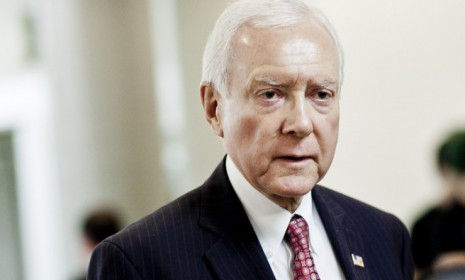What Orrin Hatch's survival says about the Tea Party
The veteran Utah Republican is cruising to a seventh term after beating the Tea Party curse and easily dispatching an insurgent conservative rival

A free daily email with the biggest news stories of the day – and the best features from TheWeek.com
You are now subscribed
Your newsletter sign-up was successful
Since 2010, the Tea Party has claimed some pretty big scalps in the Republican Party, mounting successful primary challenges to several long-time incumbents, including Sen. Robert Bennett (R-Utah) and Sen. Richard Lugar (R-Ind.). Sen. Orrin Hatch (R-Utah) was supposed to be next on the hit list after the Tea Party forced him into his first serious primary fight since he joined the Senate nearly four decades ago. But on Tuesday, Hatch seized the nomination by trouncing Tea Party-backed state Sen. Dan Liljenquist, all but assuring himself another six years in the Senate, since Hatch's November matchup against a Democrat in deep-red Utah is essentially a mere formality. What does Hatch's win tell us about the small-government GOP insurgency two years after it roared into the headlines? Here, five theories:
1. Tea Party anger has cooled
"Utah is where the Tea Party slew one of its first giants" — former Sen. Bennett — so in a way, it's fitting that the movement ran out of steam here, says Jack Healy in The New York Times. Hatch's saving grace, it seems, was that "Utah voters don't seem as angry as they were when they ousted" Bennett, and what anger they do have is aimed at President Obama. "There isn't the same anti-incumbent, anti-establishment fervor that existed in 2010," GOP consultant LaVarr Webb tells The Times. "The economy has changed, and people are feeling better."
The Week
Escape your echo chamber. Get the facts behind the news, plus analysis from multiple perspectives.

Sign up for The Week's Free Newsletters
From our morning news briefing to a weekly Good News Newsletter, get the best of The Week delivered directly to your inbox.
From our morning news briefing to a weekly Good News Newsletter, get the best of The Week delivered directly to your inbox.
2. Actually, Hatch simply "outfoxed" the Tea Partiers
After watching Bennett and Lugar get unceremoniously dumped, Hatch learned the right lesson: Take a Tea Party challenge seriously, says Ed Morrissey at Hot Air. Make no mistake, "the Tea Party went after Hatch hard" — FreedomWorks made his defeat one of its top goals — but Hatch was ready, talking up his conservative bona fides and "organizing a big ground game to be sure he could beat the Tea Party." Liljenquist's defeat "doesn't mean that Tea Party activists were any less passionate in 2012 than in 2010 — it just means that Hatch outfoxed them."
3. Big money can trump the Tea Party
"If this signals the ebb of the Tea Party tide, that would be good," since Washington needs more compromise and fewer "bitter ideologues," says The Salt Lake Tribune in an editorial. But Tea Party or no, "if you can't win a primary election with 36 years of seniority and a $10 million war chest behind you, there's something seriously amiss." The Tea Party–friendly PAC FreedomWorks pumped nearly $900,000 into the effort to defeat Hatch, but it was no match for the incumbent's money-raising prowess.
A free daily email with the biggest news stories of the day – and the best features from TheWeek.com
4. Incumbency is still a major advantage
The big lesson for the Tea Party is that "knocking off a powerful veteran lawmaker remains a tough undertaking," says Shane Goldmacher at National Journal. Besides fundraising, incumbents have certain advantages that conservative insurgents don't. Hatch, for instance, had one such "major trump card": The backing of Mitt Romney, says Michael O'Brien at MSNBC. Remember, the GOP's presumptive nominee is "held in high esteem in Utah due to his own Mormon faith, as well as the work Romney had done in 2002 to turn around the Salt Lake City Winter Olympics." His endorsement helped Hatch win.
5. The Tea Party can at least claim a moral victory
It's not all bad for the Tea Party, says Rachel Weiner at The Washington Post. Unlike Lugar and Bennett, "Hatch ardently courted the Tea Party," apologizing for his vote in favor of the 2008 bank bailout and shifting his 2011-12 voting even further right — "his American Conservative Union rating went from 90 percent to 100 percent." Shifting votes has always been where the Tea Party is most effective, says Suzy Khimm at The Washington Post. According to a new study, "the more Tea Party activists there were in a politician's district, the more likely he or she was to vote based on the movement's preferences."
Read more political coverage at The Week's 2012 Election Center.